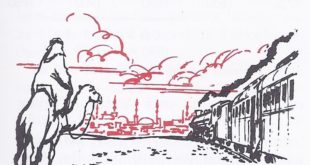Slowly the train had puffed over the heights of the Lebanon Mountains. Now, at last, it was coasting down the eastern slope. Hasan Ali, an Arab trader, gazed ahead down onto the broad Syrian plains far below. Already in the growing light of early morning he could make out some of the tall minarets of the 300 mosques in Damascus. Hasan Ali had first looked on the ancient city many years before when he was a boy. He and his father had joined the great caravan which yearly wound its way from Damascus across the Arabian Desert to Mecca, the …
Read More »Western Imperialism Influences Many Parts of the World
The British Empire Becomes the Commonwealth of Nations
On a January evening in 1896, a famous British statesman, Joseph Chamberlain, attended a banquet in honour of an Englishman about to go to Australia as a colonial governor. Chamberlain was called upon to make an after dinner speech. What he said that wintry evening years ago explains what people at that time meant by the “British Empire” and points to the changes which he hoped would take place in the future. Here is part of what Chamberlain said: I have heard it said that we [English] never had a colonial policy, that we have simply blundered into all the …
Read More »Contact with the West Brings Changes in Asia (the East)
In July 1858 a small fleet of American warships steamed into Tokyo Bay in Japan. The commander, Commodore Matthew C. Perry, had served during the War of 1812 and the war between the United States and Mexico (1846-1848). Perry’s voyage into Japanese waters did not mean that Japan and the United States were at war. Instead, Perry was bound on a peaceful mission, although it was expected that a show of force would help him to accomplish his purpose. For years American and European ship captains had tried to enter Japanese ports to trade and obtain supplies, but without success, …
Read More »Europe Annexes the African Continent
In 1871 there occurred one of the strangest meetings in history. The place was Ujiji on Lake Tanganyika in the heart of Africa. The men who met were David Livingstone, a Scottish missionary who was also a doctor, and Henry M. Stanley, a newspaperman. Livingstone had come to Africa about thirty years before. Anxious to spread Christianity and civilization among the Africans, in this unknown and mysterious continent, he had undertaken long trips into the interior. For several years, however, Livingstone had not been heard from, so the New York Herald sent Stanley, a roving reporter, to look for him. …
Read More »


